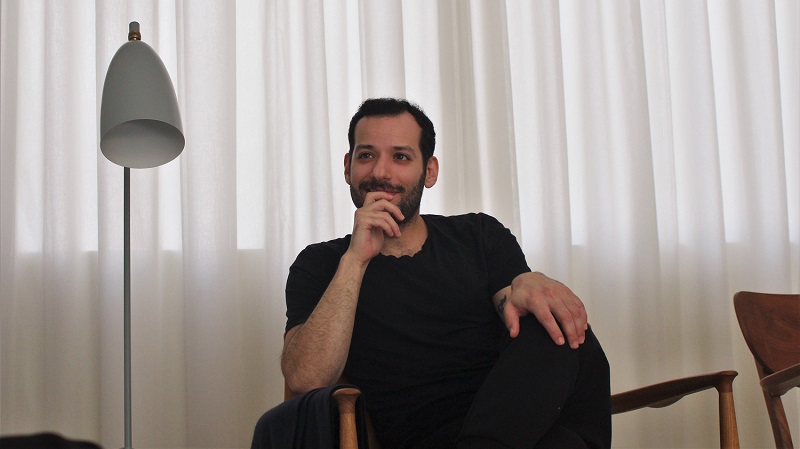You may know Firas Abou Fakher as the keyboardist with indie rock band Mashrou’ Leila, but there’s (a lot) more to him than being a part of a whole. In fact, Firas has been working on solo projects alongside his work with the band for a while now, and made his debut as a composer 6-7 years ago with the soundtrack for short film Kaleidoscope (2014). And this is just the beginning; since first dipping his toe into the pool that is cinema, after falling head over heels in college, Firas has further immersed himself in the industry, going so far as to open a production house (Last Floor) with partners, where his aim is to develop as a visual and narrative storyteller. We had the pleasure of sitting down with him to talk about architecture, Mashrou’ Leila, cinematic ventures, and plans for the future – read the full interview below!
Start by telling us: how did your music career start?
Let’s see. 20 years ago, I started playing music. I started playing guitar in school with a couple of friends, and it was nothing serious – just playing at people’s houses, jamming with friends… Until I went to AUB in 2005 and I joined the music club there. I wasn’t writing any music; I wasn’t interested in writing music. I started AUB and [during] my first year of architecture I met the guys that would end up being in Mashrou’ Leila with me. That was when we started saying that we need to write original music. A few years after that I started learning piano. I started taking composing really seriously; I started learning how to read music, how to write music, how to arrange; I started listening to soundtracks, listening to classical music, contemporary music; and most recently, I started to play the cello and the clarinet.
Mashrou’ Leila took over from 2010 until 2017-2018. It was very intense. We were touring 8-9 months a year, writing music when we could, and after that I started to find a lot of happiness in writing music that doesn’t really fit with the band and is more instrumental and is more cinematic, in a way. Ever since architecture school, I’ve been in love with films and visuals and art and installations and sound and sound design and the possibilities of sound as a medium, not just for lyrics and for songs, but beyond that. It’s always in the back of my head. And I had the chance to work on a couple of films starting 2016-2017. And then last year, in April, I was approached by a director: Henri Bassil. He’s a Lebanese-French director who was doing this short film (it’s not released yet it’s still in the festival circuit). It’s a dense film, it’s five acts, it has no dialogue; it’s just two characters, and it’s the story of how two people fall in love and fall out of love and fall back in love and whatnot. He had temp music that he realized he needs to buy the license for, and he’s like: “OK. I can’t buy the licenses for these super-famous tracks. Let me contact some composers.” He contacted a couple of people, and I was the last one to be contacted but I agreed to do it. A lot of the composers, he says, were afraid of taking on the challenge. In a regular film, you know, there’s dialogue, there’s editing, there’s action, you can mask a lot of the music within the structure of a film and the structure of the narrative… Here, there was nothing; there was the music and the dancers. It’s a 12-minute short; I ended up writing 15 minutes of music or so. I was starting to learn cello at the time, so I composed most of the score for cello and French horn (I have a very good friend who’s a very good French horn player). And that was it. It was the three of us; it was a cellist, a French horn player, and me on piano, and we recorded it here, in this room, in like 3 days. I mixed and finished it, and it was really fun; it was a really good experience. People started connecting with it and I started to get more calls asking, “listen, can we use the track for something that we’re doing? Are you free to work on this thing, are you free to work on that thing?”
Four months after doing the score for Love, I started a new venture [Last Floor], with a couple of partners of mine, into fiction film production; writing stories, mainly, and filming stories. That’s the thing I’m working on now, actually – it’s a series called “Al Shak/Doubt”. It was written, produced, filmed, edited, and composed, all within six weeks during lock-down. All the actors were in their houses – someone was in KSA, someone was in Lebanon, someone was in London, someone was in Abu Dhabi… We sent them GoPros and a little manual of how to film, and we had our director here directing over Zoom. I was doing the score for that for the past 2-3 weeks. I did [it] with things you can find in your house. I was bowing pots and banging on trays and using forks and knives and stuff like that – creating instruments out of them, sampling them… Something I like to do a lot is sample things from the reality of the show, so, a lot of it is like that – coming up with sounds from things that are very familiar but making them musical. So that’s the thing I’m working on now, which is quite fun.
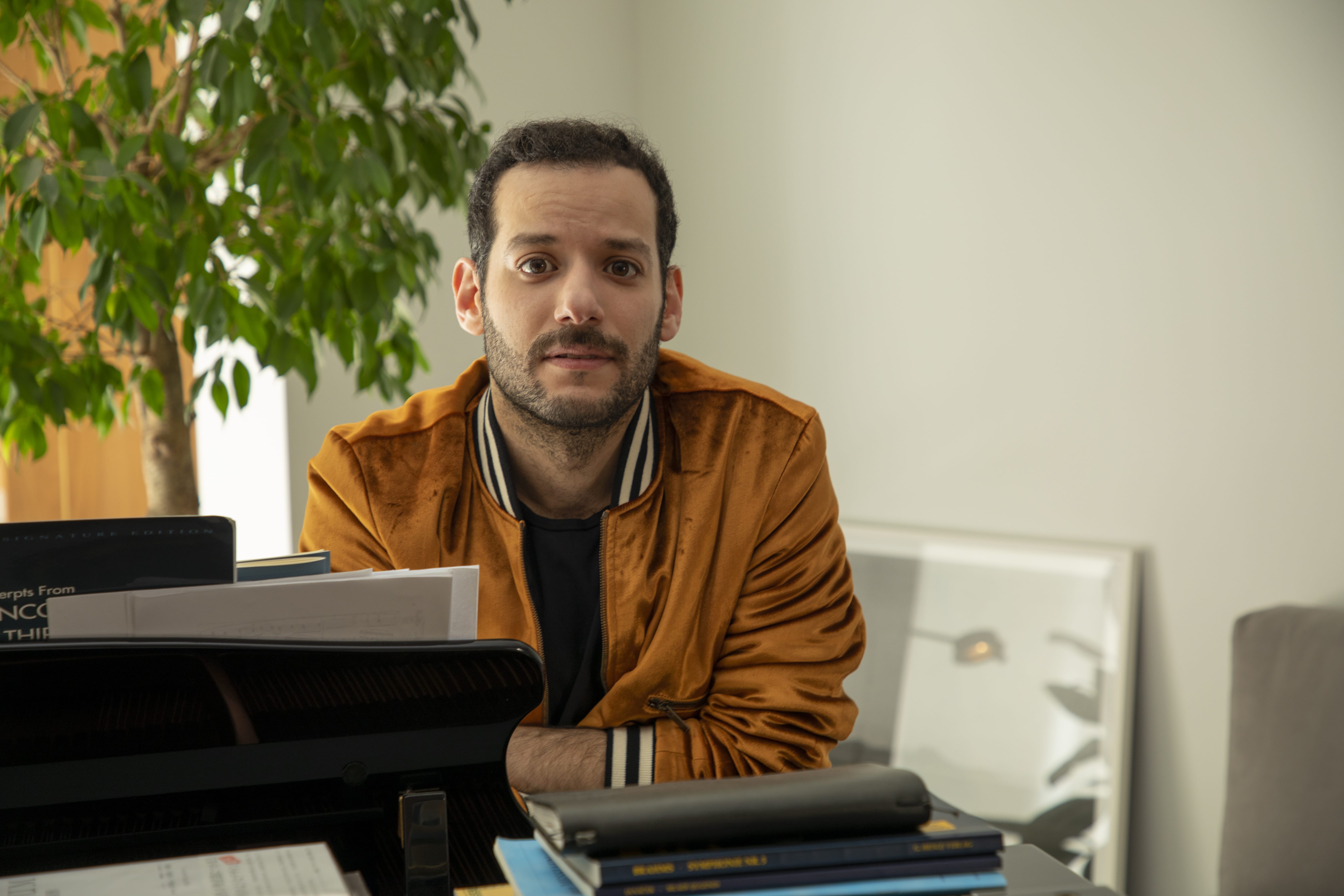
Since you mentioned Mashrou’ Leila, let’s circle back to that. Mashrou’ Leila is quite a big name, and most people don’t really know who does what – they just know Mashrou’ Leila. You tell us: what do you do in the band?
When we started in 2008-2009, we were seven people, and I was one of seven people. You can’t have seven people calling the shots and being very involved, so I was kind of on the side – happy to be part of a band, playing guitar, coming up with ideas every once in a while… And then, I think, in 2010, when we were asked to play Byblos for the first time, I don’t know why, but something clicked; I remember feeling like I needed to step up. That’s when I started to become really involved. I started to write a lot more music, and I started really being critical of things I was listening to, and understanding how a good song structure works, how a good melody can work, and how a good arrangement can work. Then in 2013 or 2014, Umayya (the keyboardist) left the band, and I had already started learning piano so I became keyboard player for the band. And also, I was recording a lot. I really love being in the studio and recording, and I do a lot of recordings of guitars, bass, synths, keyboards, percussions, and things like this; that’s how I started to become more interested in production and doing personal things because… Once you have a big palate of things that you can do, it opens up a lot – you start to see the possibilities of music very differently.
In Mashrou’ Leila, for a long time, [my role] was doing a lot of the early composing; coming up with the base ideas of beats, bass lines, chord structures, choruses and middle 8s or the bridges or the outros, doing arrangements… So when we were doing Ibn l Leil, one of the big things that we wanted to do was incorporate an orchestra, so I had to learn how to arrange for an orchestra. I got all the books, I watched all the YouTube videos, and we ended up recording something like a 120-person orchestra in Macedonia.
There are little steps that got me to where I am and interested in the sounds of orchestras. There’s also a lot of inspiration; Johnny Greenwood from Radiohead is a big inspiration – he has a similar role in a band. He wasn’t the singer; he was a person who was writing and dictating some of the ways that the direction was going, and ended up having a very different career: film scoring, and contemporary classical music or contemporary music, instrumental music, and so on. There’s a bunch of people. There’s Trent Reznor and Atticus Ross from Nine Inch Nails. There’s a very big jump between the Nine Inch Nails stuff and their instrumental stuff for films… I think the world is opening up to more contemporary sounds than big blockbuster Hollywood-style soundtracks. So that’s good.
What do you do when you’re not making music? What are some of your non-music related hobbies?
Uh… Ouf. *Long pause*
I don’t know… You know, every time I want a new hobby, I learn a new instrument. That’s how it goes. It’s a big source of inspiration for me to learn something new. Last year, when I was doing Love, I was learning the cello. A friend of mine had a cello sitting in her living room and I was [over for] dinner one day, and I told her, “I didn’t know you played the cello.” She said, “I don’t play it. I learned it for a year, 5 years ago.” So I asked her if I could borrow it and ended up learning cello for a year, which is very difficult. This year, at the end of January or February, I bought a clarinet because I couldn’t travel with the cello – it’s too big, and I wanted something small that I could play in hotel rooms when I’m traveling or play or practice when I’m away, so I started learning the clarinet.
I like collecting instruments – this is something else that I spent a lot of time doing and researching. I have a Wurlitzer that I found in a dumpster in London that I refurbished; I have a Rhodes that I found here in a studio that was basically being torn down that I found and I refurbished. [The piano here] has a crazy story… I always like finding things and adding them to my collection of instruments. That takes up a lot of time, actually. Researching and refurbishing, buying pieces online and fixing them and making them work and such. What else? I don’t know, I don’t have hobbies. I like to exercise, I like to swim, I like uh… plants.
I mean I love architecture and I love film. And I love writing. Recently at Last Floor, with the team, I’m trying to get better as a storyteller – not just a musical storyteller, but an actual visual or narrative storyteller. That’s something that’s been on my mind a lot and it adds a very critical eye to a lot of things that you see; you start to see the way things are done and what works and what doesn’t work… I’m always interested in things that walk the line between what’s very accessible, and what’s very auteur and not accessible and very niche.
I’m not a big fan of doing things for myself. I know a lot of artists say, “do what you want to do, and don’t listen to other people”. Sure, yes, that’s great, but also, at some point, I do understand that there’s an audience and having an audience is not a bad thing – even in film, even in writing, even in music, you know? In general, that’s my approach to thinking about music, or film, or writing, or whatever it is; I want things that are accessible to a large audience that can still retain artistic integrity – that can still send a good message. I don’t mind a show being on TV or music being played on the radio – on the contrary, I think they’re very positive – if the work itself retains some factor of artistic integrity, technical integrity, innovation, conceptual thinking or barrier-breaking. This was the approach for me with Mashrou’ Leila as well, and when I write music for Mashrou’ Leila, this is what I think about. I don’t want to write things that are obscure and that only I admire, you know? It doesn’t mean much.
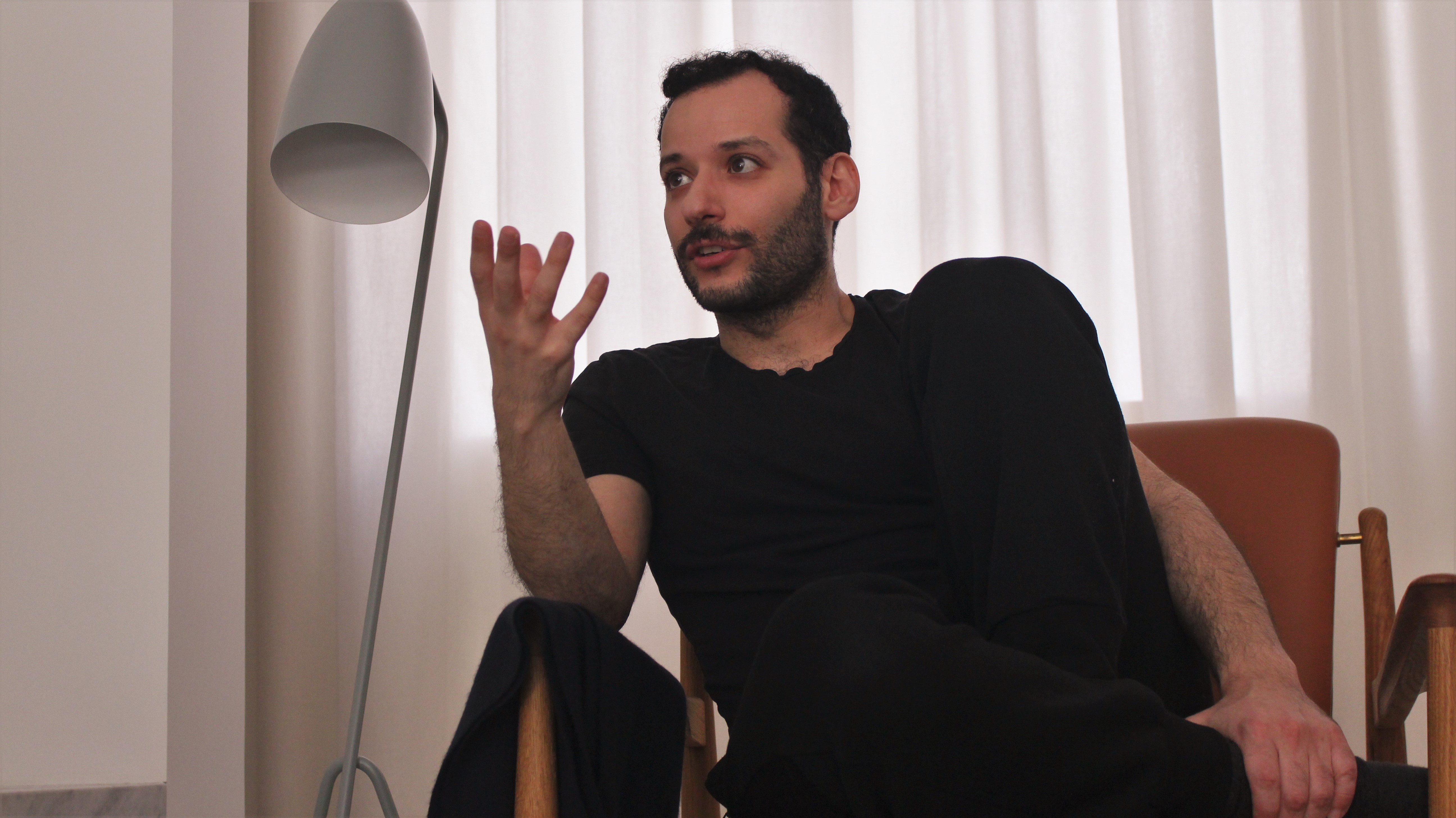
Back to the past – you studied architecture, but you didn’t really work in the field, did you?
I did, I worked for a year in an office. After I graduated in 2011, I worked for a bit less than a year in a big architecture office here, but I was working 9 hours a day, and then going to the studio for the next 5 hours and repeating the cycle every day, so it was very tiring and everybody was drained. At some point, in 2011, we were like, “OK, if we want to take this band seriously,” and if I want to take my music career seriously, I have to make a choice, so I quit in August of 2011. [I mean, yeah,] I haven’t had an architecture job since then, but I’m a big fan of architecture. I love designing things, and I’ve designed a couple of houses for friends. I’ve done my own house – obviously this is something I took a lot of time doing and a lot of care doing.
What do you listen to when you’re not listening to stuff you need for work?
I don’t listen to music very much. I mean I do, but I listen to music that has to do with what I’m working on. OK, sometimes, I [go through], I don’t know, a week of listening to one thing – it’s more of a nostalgia thing than anything. I listen to Top 40 when I exercise; I listen to whatever’s in the charts to keep up to date with what’s happening and how things are moving. I listen a lot to hip hop, rap, r&b; I listen a lot to classical music, contemporary classical music; and I listen a lot to my, sort of, nostalgia artists, [so things] from my early 20s and teenage years, like… I did like a week of only listening to The Cure. I did a week of listening to Blink-182. Just nostalgia binges, basically. In terms of discovering new artists, it has a lot to do with streaming and seeing what people are listening to. I’m a big fan of playlists so I’ll listen to people’s playlists. I follow a couple of people who are always updating their playlists. NPR Tiny Desk is a source of good new music. And KXP. There’s that other one, the Australian one – they do “Like A Version”? There’s a bunch of YouTube radio stations. Podcasts! That’s a hobby. I like podcasts. I like listening to podcasts.
Since you listen to the charts, do you have a favorite pop or commercial artist?
I like a lot of it. Who’s been doing cool things recently? Dua Lipa’s stuff’s quite nice. I think the album is very good, it has a very good feel. I like a lot of things Diplo does and Mark Ronson does. I’m a big fan of the Mark Ronson aesthetic. Who else has been doing cool things recently? Travis Scott. I like Travis Scott’s [sort of] psychedelic take on things, on trap… I’m a big fan of Ed Sheeran. I think Ed Sheeran is one of the most prolific and talented people. Stormzy. I’m a fan of the London grime scene. What else? I’m waiting for the new Kendrick stuff, I’m a huge fan of Kendrick Lamar. What else? Disco – I generally like disco-tinged stuff, which is why Dua Lipa’s album is very nice; it has a very nice disco feel. I like all of it. I don’t like the stuff that’s very meme-y; there are songs that are very meme-based and are just annoying. I can’t do it. But I like all of it. I like the Justin Bieber stuff; I like the Harry Styles aesthetic that he’s doing, it’s very cool; DJ Khaled does cool things; Chance the Rapper. Obviously Childish Gambino has become part of the charts now, but I really like Childish Gambino. I don’t know, it’s all good, you know? For me [they’re] all things you can listen to and learn from; it’s all very high-quality; it’s all very good songwriting; it’s all very talented people working. It’s very rare to see a song that doesn’t have something good in it make it to the charts. It might not be my favorite song of all time – probably will not be – but something in there is good and should be listened to or learned from.
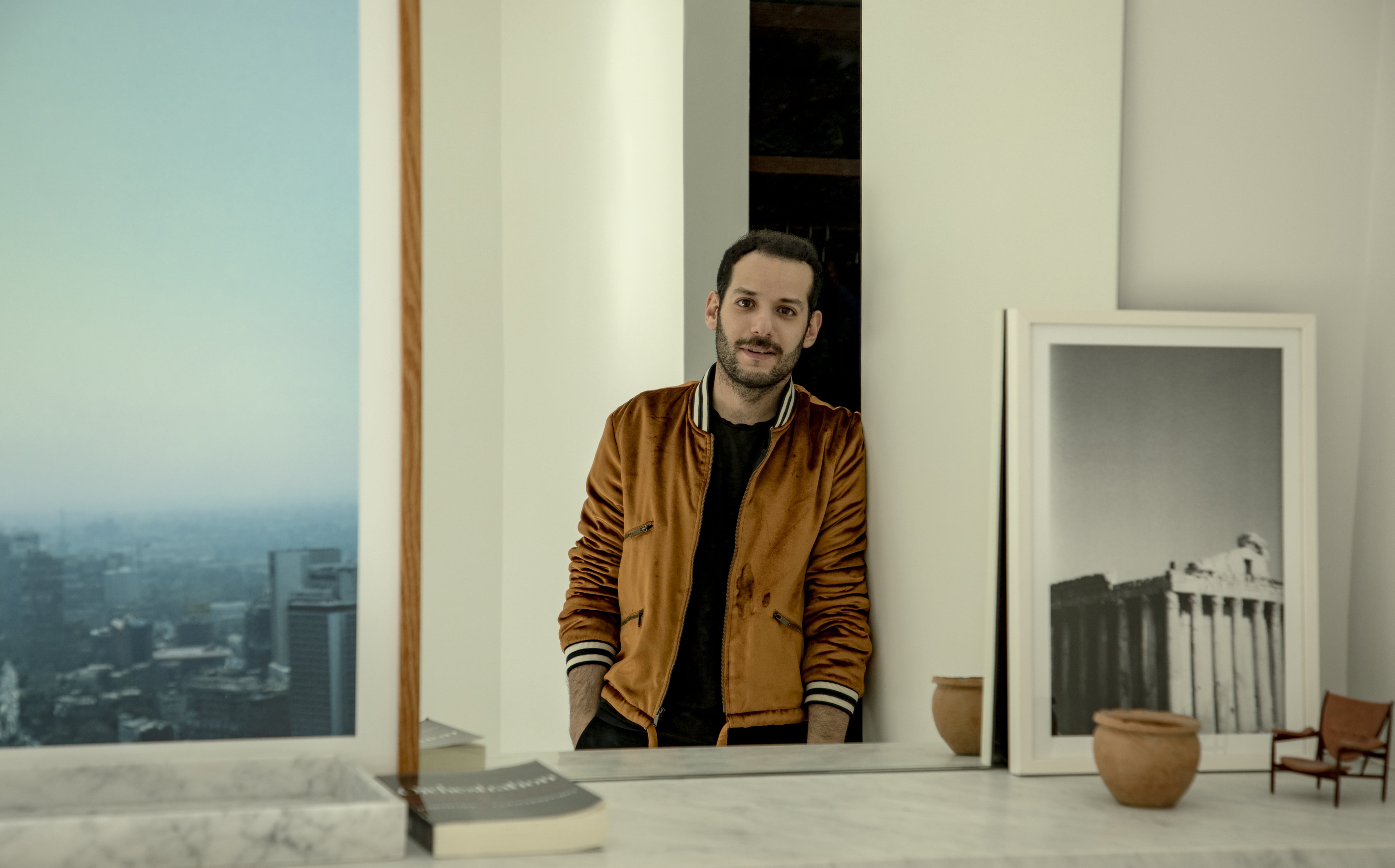
Is there an artist you’d like to play with on stage, as a musician?
I don’t know, Ed Sheeran? I think Ed Sheeran’s pretty cool, I really like what he does. I think he’s very talented at creating very memorable, instantly catchy songs. Good lyrics. He can do very sappy, lovey songs, but can also do really hard-hitting, good bass lines, good beats; he has good producers that work for him. Who else? St. Vincent. I would like to play with St. Vincent, I’m a fan. Lizzo, I’m a fan. Who else is doing cool things? Janelle Monae, I’m a fan.
At some point in your life, if you were forced to or you decided to stop making music, would you go back to being an architect?
If I were forced to stop making music, yeah. What else would I be? I don’t know. Maybe I’d go back and study – that’s an option for me. But I mean, if I can’t make music, I’d try to be around music in some way, either in production or in orchestration or in being a music editor on a film… I don’t know. I’d try to stay around music if I can’t compose it – if someone told me I wasn’t allowed or I’d die if I get close to it. But you mean if it’s unsustainable and I can’t make a living out of it?
Yeah, if things get worse in terms of Coronavirus or…
Yeah, yeah. No, I think I’m more interested in pursuing what I’m doing with Last Floor, which is writing and producing stories and films and being a storyteller in another way. Architecture is another form of storytelling, I mean, so I wouldn’t be sad if I had to go back to architecture; I’d be sad if I had to go back to an office. I don’t think that’s something I’d like to go back to at 35. I love architecture. I have a couple of projects that I am working on that are passion projects; for me, it’s not a career. It’s more something that I enjoy doing a lot. And I love furniture, I love materials, I love aesthetics and working with things… So that’s where that comes from. Otherwise, maybe I’d be a farmer. Honestly.
But yeah, I mean, I don’t know where music is heading. Live music is on pause for now and I think even when things open up people will not be very excited to go to concerts – I know I wouldn’t be. Things have to change for musicians and [the musicians themselves] have to change and the industry has to change a little bit; the executives have to change. Streaming is still not a very viable source of income for most musicians; at least 85% of musicians are not able to sustain themselves. There are 40,000 new songs a day on Spotify so it’s hard to break through that cloud. But you have to be resourceful. I think [one] of the things that I’ve learned is that you have to be a jack of all trades; you have to be a renaissance person now – you can’t say I only play piano and that’s what I’ll do and things will work out. You have to promote yourself, you have to be your own PR agent, you have to be your own business developer, you have to be your own financial planner, you have to be your own graphic designer, you have to be your own film editor… You have to do all these things, otherwise it’s not going to happen. Other people try new things. TikTok is a way for a lot of musicians to get famous. It works, I don’t know. The Arabic language barrier is also something that still exists…
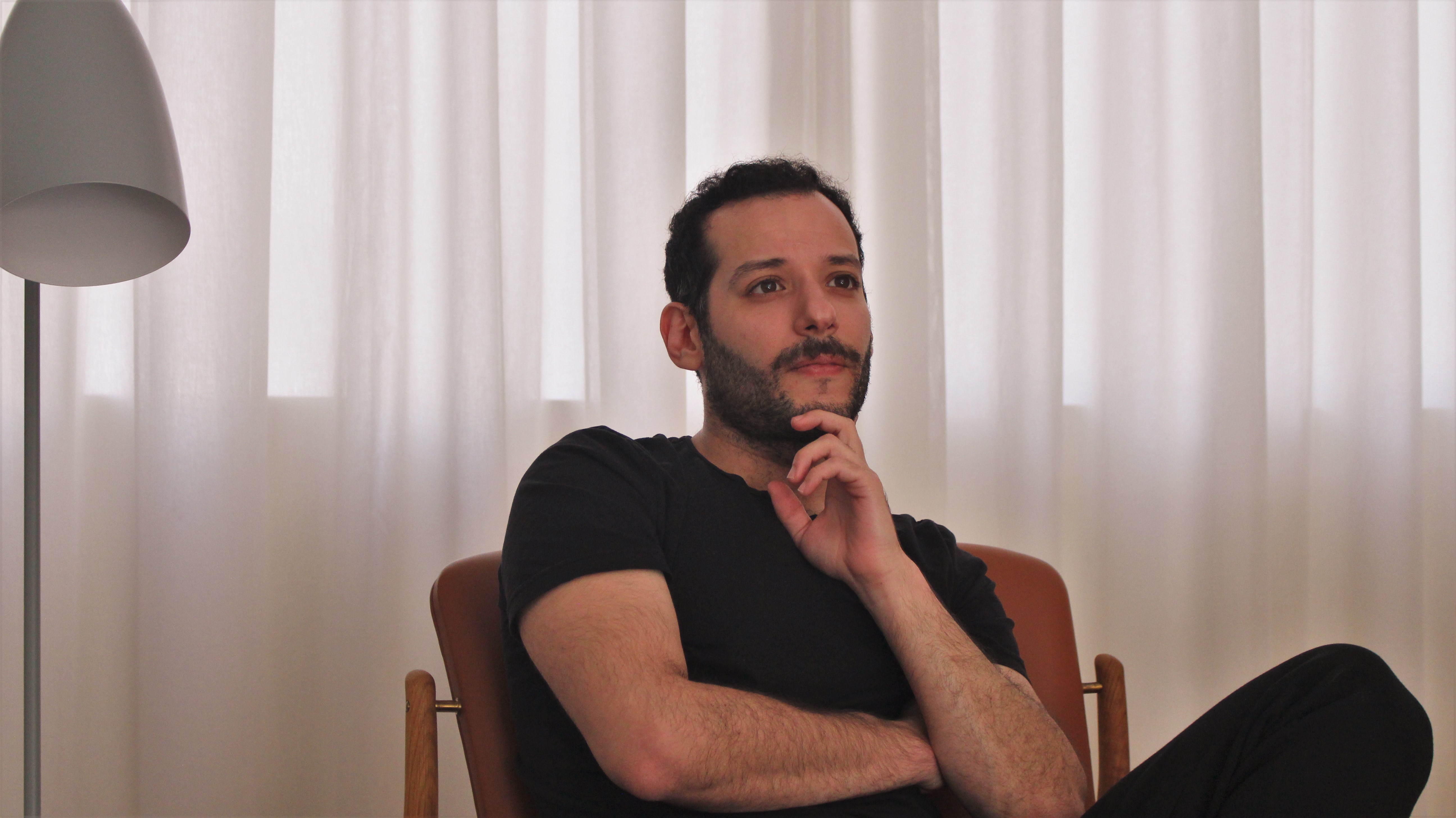
Billie Eilish kind of proved otherwise, with the whole Nancy Ajram thing!
Yeah, yeah. Billie Eilish is also a very unique, unicorn type of artist. I think people who are exposed and have access to culture beyond their own – whether it’s people from America who have access to cultures and beyond or whether it’s us that have that access – I think that level of people is becoming more and more diverse. I think, at the consumer-level, things are still very tough, and you can see it when you go into a meeting with a label or a meeting with a music executive. The fear is always that the Arabic language is not easy to sell. So, yes, if you’re somebody who’s looking for it and somebody who’s pursuing it, of course, you’ll find amazing things. I don’t know… I mean Despacito is not in English, no? Gangnam Style was not in English. There’s hope, I’m not saying there’s no hope, but it’s hard. People will not be helping you, that’s why I’m saying you have to do everything. You can’t expect people to just go along for the ride, you have to be resourceful, figure out ways to keep active. If you’re a musician working today you have to really be extremely active. Most of the things I watch on YouTube are musicians who found a way of making money through their YouTube stuff, whether it’s tutorials or little features or doing interviews… There are ways for you to stay within music and make money as a musician. It’s fun too. I mean for me it’s really fun! I enjoy learning new instruments, I enjoy sitting in my studio and working – thinking about things, reading a lot of things about music… Yeah.
When you’re not at home doing your thing, where can we find you? Where is the typical Firas Spot?
*Laughs* At home! I spend a lot of time at home. Too much time at home.
You don’t have a favorite hangout spot in the city?
Not really. I mean there are a couple of places that I [used to] frequent, but not anymore… I’d been traveling since October, I came back on the 3rd of March, and almost 5 days later they locked down the country. So it’s been kind of 8 months [that] I haven’t really gone out to a place. There are some really nice places – I mean I love Kissproof, I love Happy Prince… They’re both really good and they make good cocktails. Bingsutt makes really good stuff too. But I prefer hanging out with people at their houses and such. I don’t know, that’s it. Cinema – I go to the movie theaters a lot. It used to be a 5-minute walk to Metropolis but it closed. Now it’s a 5-minute walk to ABC.
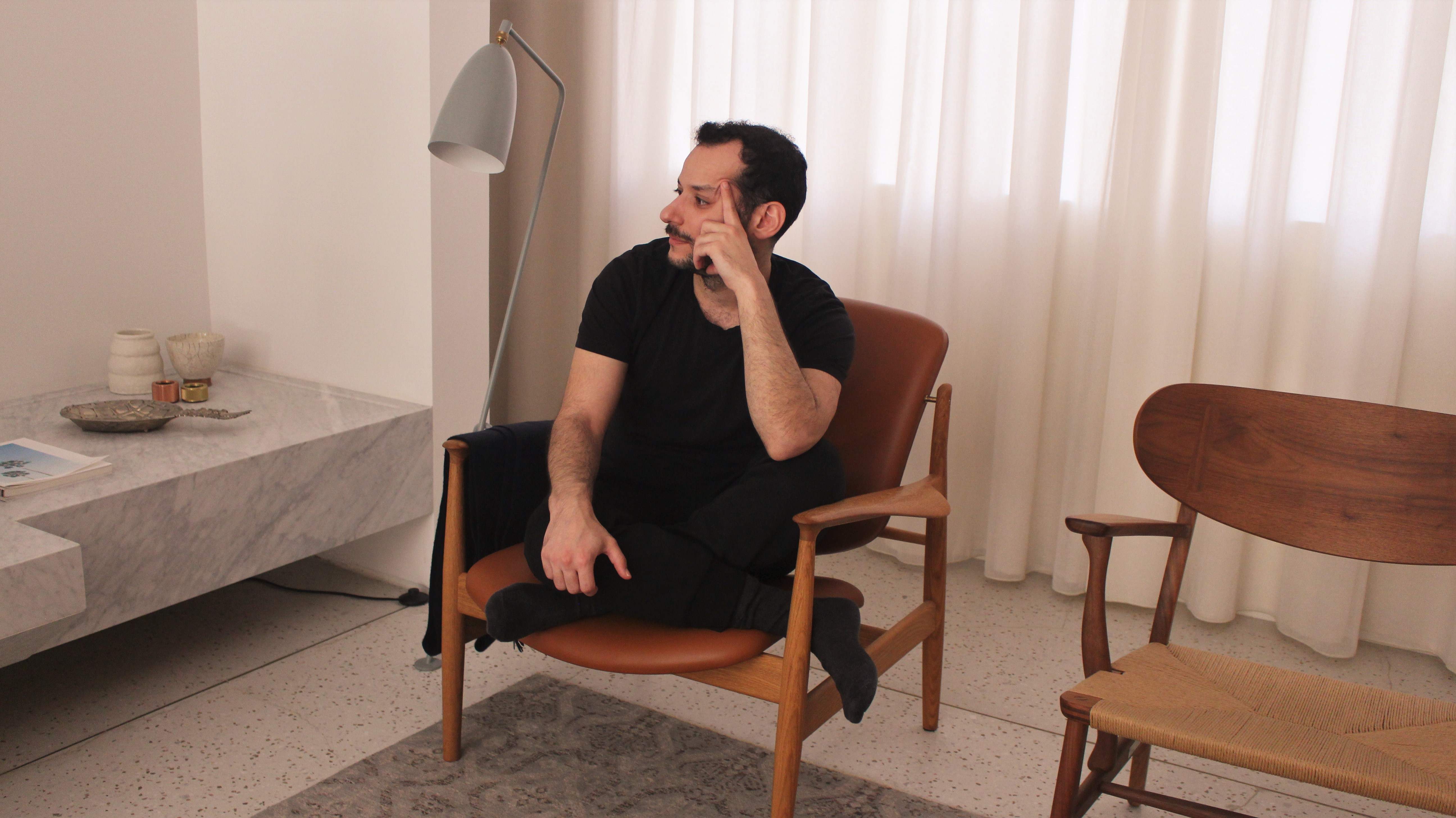
Do you drive? If yes, what do you listen to when you’re driving?
I do drive. Podcasts. Not music. Or music that has to do with what I’m working on. [For example], today I drove up to my parents’ house in the mountains and I was listening to a horror score because I need to get ideas for how horror cues can sound, what works, what to avoid, things like that… I was listening to the music from The Lighthouse, which is a couple of months old horror film by A24. I was listening to music from Hereditary which is another very good horror film – it’s by Ari Aster. And then I listened to podcasts: Radiolab, there’s a very good one called No Such Thing As A Fish, Invisbilia… I really like podcasts. They’re my [main] source of information.
Would you ever start a podcast?
Uh… No. Maybe I could help be part of a podcast, but no, I don’t think so… Unless it’s a very technical podcast. But then it’s not a podcast, then it’s like a Master Class-type audiobook. And a podcast has to be very up-to-date; you have to keep up with current events, which is not my thing. I mean, I’m not against it, I just don’t think I have many ideas for a podcast. I would do audio fiction, not podcasts, but audio fiction. There’s a really good one called Blackout, starring Rami Malek, which is like a fictional podcast, basically. There’s another one which became a series with Julia Roberts. I forget what it’s called now, but it also started as a fictional podcast. That, I’m very interested in, because with that you rely very much on sound; on sound design, on designing spaces and making things come alive for somebody in their mind. But talk shows and Joe Rogan and things like that, I’m not very interested in. At all.
What do you have planned for the near future?
For like 2-3 weeks, I’ve been working on Al Shak with Last Floor. There are a couple of projects coming up that are quite exciting that I’ll be doing the music for as well. There’s a composition that I’m working on, that I just got funding for by Al Mawrid Al Thaqafi, about immigration; it’s based on the story of my family’s immigration when we were kids. I was a year old. So this is a big piece that I’m hoping to premiere in about a year, a year and a half. Yeah, that’s it. I want to keep working on the Mashrou’ Leila stuff, keeping that up-to-date, figure out how to keep it going, writing, learning how to write better and learning how to write and tell interesting stories, learning clarinet. I’d like to get some clarinet lessons but I don’t know where to start, with everything that’s happening. I want to learn a new instrument, but I don’t know which one honestly. The only thing left to think of is a brass instrument. I can (kind of) play a string instrument which is cello, I can (almost) play a woodwind which is the clarinet – the only thing left is a brass instrument. Brass instruments are very loud; very hard to learn at home, and very hard to start. It’s like cello, actually. Cello was very challenging. I did like 4 months of learning the clarinet and I’m already way better than I was a year after learning cello. I think brass is similar. Maybe I’ll get a French horn or trombone or a bass sax or something like that. I also have a plan to build an instrument, with the help of a carpenter. It’s like an analog noise machine that could be useful for scoring. I’m designing it. I started that plan in February and everything’s been closed, but it’s ready to be unveiled – I just need to build it. It’s for recording; more of a sound design thing; more something to give life to certain things.
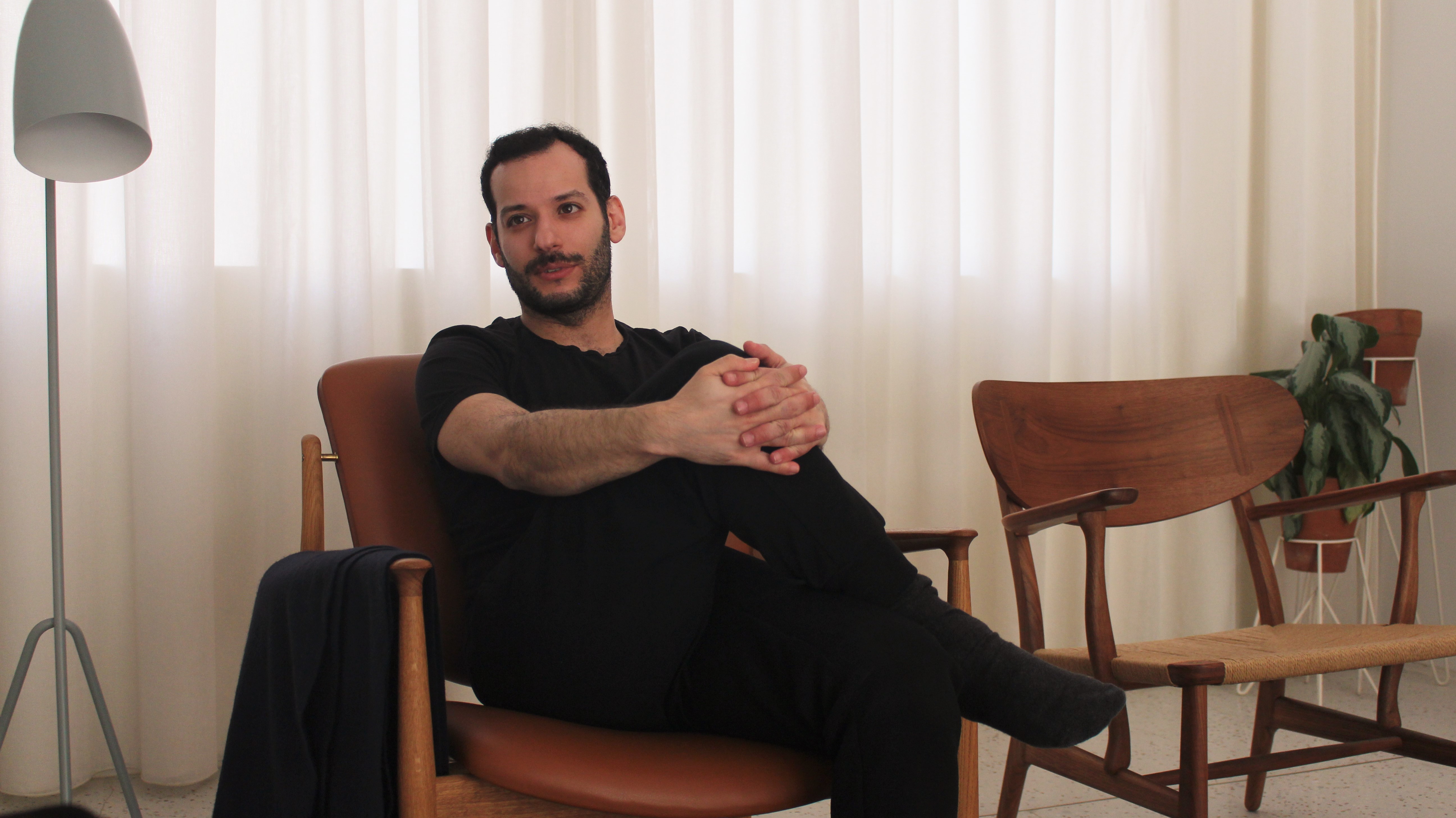
What was the inspiration behind the tracks/score for Love? We interpreted it as, maybe, the different stages of a relationship or of being in love with someone.
I mean, the film itself is that. It’s based on this theory of love of 5 stages: passion, couple-hood, disillusionment, acceptance or understanding, and then finally, commitment. Those were sort of the chapters for me to think about. The way that it started, though, was coming up with a theme. It’s a big thing in films – it’s not very big in pop music or in contemporary songwriting, but thematic content is very big in films. The first thing that I try to do is to come up with themes for the character; usually I start with a very developed theme and then I have to strip it down into how it can begin, so it’s a weird process of working backwards. That was the first thing I started with: thinking of a theme that could represent a passion and a failure – at some point in the film there’s a failure (their love fails) and a triumph. I also wanted something easy enough for me to be able to play on the cello, which was a big restriction. It was meant to be quite basic, until I started complicating it and I needed a better cello player than me to record.
Usually it has a lot to do with thinking of the character; when I start a film score, I’m thinking of the characters and how the themes can overlap. The music tells a story, and if you’ve ever seen a film [with and] without music, it’s a very different film, especially genre films; horror films, fantasy films, cop films, crime films, gangster films, sci-fi – these things are very heavy on music because it gives it an extra layer of emotion and storytelling. If you’re good enough, you can [communicate] what’s going to happen, and very often the audience knows what’s happening in a film because of music cues. I’m sure you’ve had these moments where you realize, “oh, obviously this guy is evil” or “oh, obviously that phone is going to be important in the film” – it’s usually because of the music, because there’s a cue; there’s a signifier. Thinking through that was a big inspiration for the film and [so were] the limited resources. I had two weeks! I had one cello player and myself on piano, so I had to make a score for only those things, which is good. It’s a great thing, having limitations; it forces you to be creative and come up with different things: how can you make it textural in different ways? How can you make it express different things, although you’re using the same 3-4 things? The inspirations were more the limitations rather than saying, “OK, the world is open in front of me – what do I do?” It’s more “what do I have? What are the resources I have? How long do I have to do this?” And that’s where it comes from, which is usually the case. I mean, working on film scores or working on commissioned compositions is very different than working as a songwriter, because as a songwriter, [you move at] your pace. With a film score, you follow the pace of a film; of an editing team; of a director. Same thing with commissioned music – you have premieres, you have release dates… Working that way is very different, and it’s the limitations that become very important. And keeping yourself up-to-date – listening to things that keep you in check and remind you where you’re lacking and inspire you to become better or, you know, make you ask yourself, “how can I be more like this person?” are important. I think that’s it, honestly.

